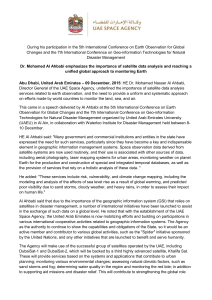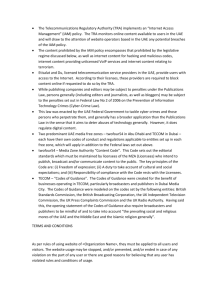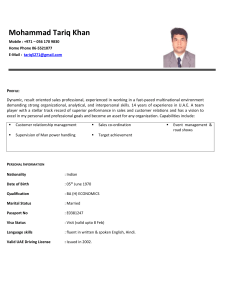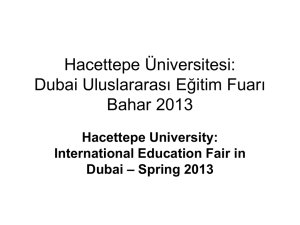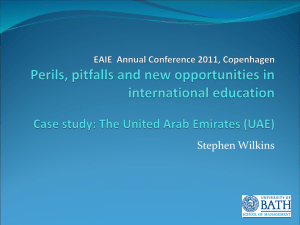Présentation PowerPoint
advertisement
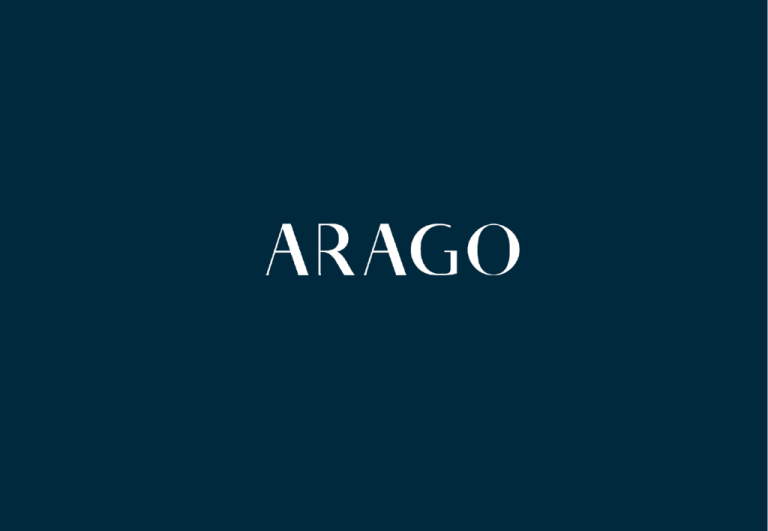
Legal Aspects of doing business in the UAE • GENERAL FACTS/LEGAL FRAMEWORK 3 • DEALING FROM OUTSIDE THE UAE 7 • OPERATING INSIDE THE UAE 8 - Incorporating a local company - Setting up in free zones • DISPUTE RESOLUTION 14 2 General Facts Federation of 7 Emirates. Independent foreign state on 2 December 1971 (RAK: 1972) Capital: Abu Dhabi Civil law jurisdiction Federal court structure with a final court of appeal in Abu Dhabi (the Abu Dhabi Supreme Court), both Dubai and Ras Al Khaimah are not part of the federal judicial system. 3 An adapted legal framework a) An inclusive and pragmatical federal framework: (referring to civil, economical and corporates maters; criminal and personnal statuts issues being more specific) • Civil law • Common law • Shari’a b) A comprehensive corporate system: several legal form are availables for a business development in the GCC/MENA/MEANSA : • Local companies (Sole Proprietorship / Limited Liability Company / Public Jointstock Company / Private Joint-stock Company / Limited Partnership) Branch/Representative office Free zone entities • • c) Tax free environment • • No incomes tax/no corporate tax (except for banks and oil companies). The UAE have entered into several tax treaties as to avoid double taxation, such as Spain (entered into force in 2006) 4 An adapted legal framework d) Low customs fees • • Low customs fees Imported goods into free zones are exempted / Goods imported in the UAE: 5%, for all GCC countries, except for alcohol and tobacco. e) Free movement of capital • • Profits can be easily repatriated No exchange control f) Labour law • • • Few restrictions for hiring foreign employees Costless labor A balanced labour law 5 An adapted legal framework g) Trade Mark Low customs fees • • • UAE/GCC Paris Convention for the Protection of Industrial Property WIPO h) Visa • • Investors Employees 6 Dealing from outside the UAE The commercial agency law regulates the appointment of a local agent for: • • • Distribution Commercial agency Franchise 100% UAE (either an individual, or a company held by 100% Emirati shareholders). Issues: • • • Might not be specialized in this market High level of protection for the Emiratis (mandatory registration of contract , exclusivity, difficult to terminate) Fear of legal disputes that will block the UAE access Nb: Tailored for specific products, already widely distributed within the UAE 7 A set up inside the UAE: local companies Representative office: • • • • Nobusiness activity/ Market studies Pre and post preparation of contracts Local agent Low cost option Branch: • • • Mother company incorporated ≥ 1 year Business activity similar to its mother company Appointing a local agent mandatory (exception : free zone) Comments: • No legal personnality • Accounting related to the state of origin • Unlimited liability for mother companies Daughter company: • • Own legal personnailty 51% of the share capital to be held by a UAE national (exception : free zone) 8 Local companies Foreign investments for a company established in the UAE must be at least 51% owned by a UAE national unless: (a) based in Free Zone, (b) certain type of sole proprietorship, c) company owned at 100% by GCC nationals. The most common form of business vehicle used by foreign companies is the limited liability company (LLC), between 2 and 50 shareholders: • • • • • • Flexible management structure: minimum of one and max of 50 managers No minimum share capital (to be sufficient to achieve its purpose) In-kind contribution authorized (MOA) Minority shareholders protection Ease of formation Distribution of dividends Registration formalities: • • • Initial approval (company name, shareholding structure etc.) Signing of MOA + NOC from external authorities (for example, additional approvals from the Dubai Municipality are required to license a contracting company). Final approval 9 Free Zone entities Free zone: Geographic area where companies benefit from tax and economic advantages to encourage economic activities. Freee Zones are part of the country’s territories but considered to be outside the customs territory and subject to customs control other than normal customs procedures. Own rules and regulations. Free zone entities: • Free Zone Establishment (FZE) Sole shareholder. Share capital : based on the activity, from 100 000 AED (20 000 Euros) to 1 million AED (200 000 Euros). Liability of a shareholder limited to the value of its shareholding. • Free Zone Company (FZC) Between 2 et 5 partners. Share capital: based on your activity, from 100 000 AED (20 000 Euros) to 1 million AED (200 000 Euros). Liability of a shareholder limited to the value of its shareholding • Branches Mother company has to be incorportaed for at least one year. No minimum share capital required. No local agent required. 10 Free zone entities 3 categories of licences availables: • Commercial / Trading / General trading; • Service / Consultancy; • Industrial. A one stop shop: • Swift set up / one stop shop (as opposed to local companies set up that will involve several minitsries: DED : licensing, notary public : signing, Ministry of Immigration and Labour + other if NOCs required). • All included package and assistance from the free zone auhtority. Full assistance from the Free zone: • Many services availbales advertisement, recruitment). • after the incorporation (insurance, design, Services billed separetely but implemented for the ease of the business development 11 Free zone entities A cost effective solution: all included packages (incorporation fees, license, offices). 100% of share capital and full control of the company. Opening of bank account: • Banks became very careful to the business reality of the project. Meeting with the bankers mandatory • Informations required: current clients, targeted markets, estimated turnover, countries involved in the business of the comapny, business plan, etc. • Simple structuring. As long as it is not compulsory, complicated schemes should be. NB: legalization of corporate documents: documents issued abroad have to be legalized (notary, Foreign Office in the State of origin, UAE embassy, UAE Foreign Office). 12 Free Zones - Pros & Cons - Pros: • 100% foreign ownership • Wide network of tax treaties for avoiding double taxation. • Balanced Labour law, costless labor. • No sponsor required • Free tax jurisdiction • No custom fees • Sole shareholder • Good infrastructure • Client service • Easy visa process etc… - Cons: • No access to the UAE territory (only a few exceptions) • No option to change your office location 13 Dispute Resolution Conciliation/Mediation Litigation: • • • • Civil Commercial Criminal Labor As the UAE has established itself as a regional hub for international business, Arbitration is gradually becoming a popular method of dispute resolution: • • • Abu Dhabi Commercial Conciliation and Arbitration Centre Dubaï International Arbitration Center DIFC Arbitration Center : DIFC-LCIA : promote and administer the effective resolution of international business disputes through arbitration and mediation, offering all the services that are offered by the LCIA casework secretariat in London. 14 Contact us Arago FZC - Ras Al Khaimah, Free Trade Zone contact@arago.ae T : +971 7 226 4100 - F : +971 7 226 4122 15 ARAGO Legal Consultants Al Naeem Tower 2 Al Nakheel – Ras Al Khaimah United Arab Emirates T : + 971 (0) 7 226 4100 F : + 971 (0) 7 226 4122 ARAGO SC Sheik Zayed Road Dubai United Arab Emirates T : + 971 (0) 55 210 1982 ARAGO AARPI 20, rue Fortuny 75017 Paris France T : + 33 (0)1 45 05 15 65 F : + 33 (0)1 45 05 45 66 ARAGO Niamey 20, rue Fortuny 75017 Paris France T : + 33 (0)1 45 05 15 65 F : + 33 ( ARAGO Beirut Law Firm Alfred Nacache Street Ashrafieh – Beirut Lebanon T : + 961 (0)1 333 605 F : + 961 (0)1 333 604 Find us on www.arago.fr 16



